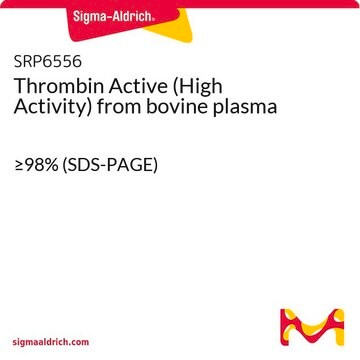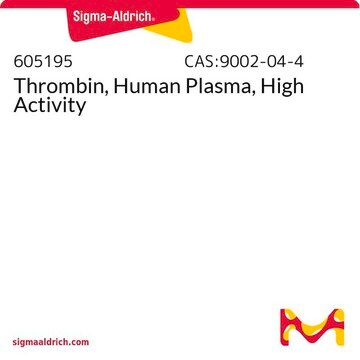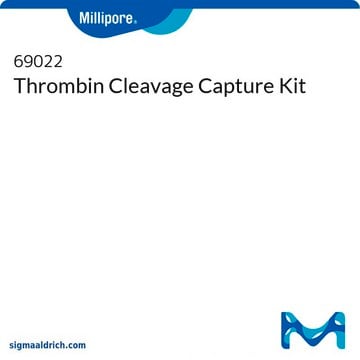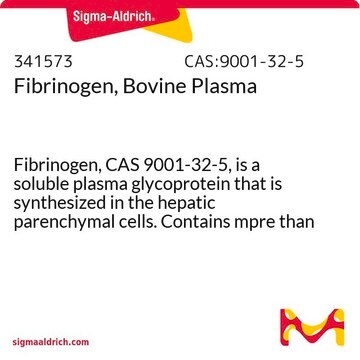604980
Thrombin, Bovine, High Activity
Synonym(s):
Thrombin, Bovine, High Activity
Sign Into View Organizational & Contract Pricing
All Photos(1)
About This Item
Recommended Products
biological source
bovine
Quality Level
form
lyophilized
specific activity
≥1800 NIH units/mg protein
manufacturer/tradename
Calbiochem®
storage condition
OK to freeze
solubility
water: soluble
shipped in
ambient
storage temp.
−20°C
General description
Thrombin is a sodium-activated type II enzyme. This serine protease enzyme consists of two anion binding exosites, ABE-I and ABE-II. Thrombin is synthesized from zymogen prothrombin (factor II) in the liver. Bovine A-thrombin comprises a light chain (A chain) and a heavy chain (B chain). These two chains are linked by non-covalent interactions and by one disulfide bond.
Application
Thrombin, bovine, high activity has been used:
- to stimulate LNCaP cell and to study the effect of activation of G-protein-coupled receptors (GPCRs)
- in fibrin gel fabrication
- to form fibrinogen gel by fibrinogen gel-based method
Biochem/physiol Actions
Thrombin converts fibrinogen into fibrin and activates factors V, VIII, XI, and XIII. It promotes platelet activation and vascular contraction. Thrombin stabilizes the fibrin polymers. It plays a crucial role in the final stages of the blood coagulation cascade.
Warning
Toxicity: Harmful (C)
Physical form
Lyophilized from 200 mM NaCl, 50 mM sodium citrate, 1 ml 0.1% PEG, pH 6.5.
Analysis Note
Complete activation from homogeneous prothrombin by SDS-PAGE
Legal Information
CALBIOCHEM is a registered trademark of Merck KGaA, Darmstadt, Germany
Signal Word
Danger
Hazard Statements
Precautionary Statements
Hazard Classifications
Eye Irrit. 2 - Resp. Sens. 1 - Skin Irrit. 2 - STOT SE 3
Target Organs
Respiratory system
Storage Class Code
11 - Combustible Solids
WGK
WGK 1
Flash Point(F)
Not applicable
Flash Point(C)
Not applicable
Certificates of Analysis (COA)
Search for Certificates of Analysis (COA) by entering the products Lot/Batch Number. Lot and Batch Numbers can be found on a product’s label following the words ‘Lot’ or ‘Batch’.
Already Own This Product?
Find documentation for the products that you have recently purchased in the Document Library.
Segall JA and Liem TK
Congenital and Acquired Hypercoagulable Syndromes, 339-346 (2007)
Kitchens CS, et al.
Consultative Hemostasis and Thrombosis null
Diana L Diesen et al.
Vascular, 16 Suppl 1, S29-S36 (2008-03-01)
Thrombin is a common hemostatic drug used in surgical practice for over 100 years because of its simplicity and efficacy. Thrombin converts fibrinogen to fibrin, activates platelets, and induces vascular contraction. It is available in multiple forms, including human thrombin
Isis S R Carter et al.
Thrombosis, 2010, 416167-416167 (2010-01-01)
Although prothrombin is one of the most widely studied enzymes in biology, the role of the thrombin A-chain has been neglected in comparison to the other domains. This paper summarizes the current data on the prothrombin catalytic domain A-chain region
Madhavi A Jadhav et al.
Biochemistry, 49(13), 2918-2924 (2010-03-12)
The formation of a blood clot involves the interplay of thrombin, fibrinogen, and Factor XIII. Thrombin cleaves fibrinopeptides A and B from the N-termini of the fibrinogen Aalpha and Bbeta chains. Fibrin monomers are generated that then polymerize into a
Our team of scientists has experience in all areas of research including Life Science, Material Science, Chemical Synthesis, Chromatography, Analytical and many others.
Contact Technical Service










